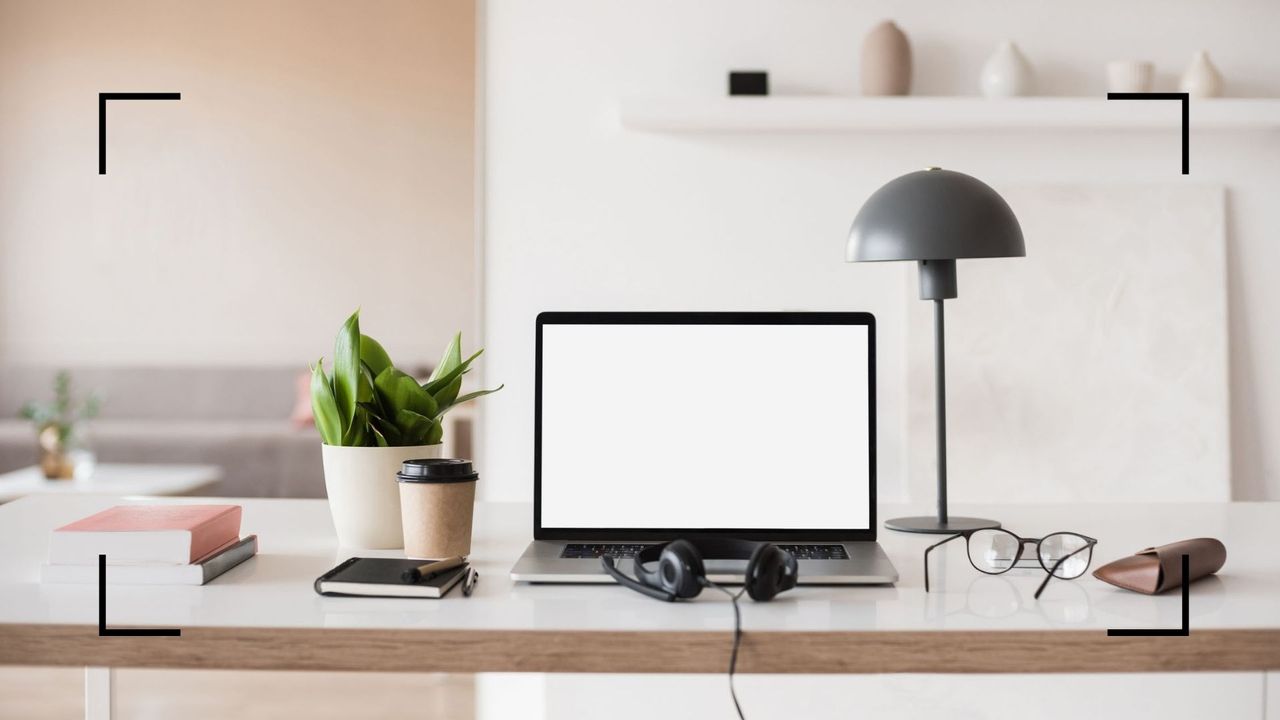Working from home tips: simple ways to make sure you're still productive
These simple working from home tips are easy to implement and should make your daily tasks a lot easier to achieve

There are many benefits to working from home, but some of us can occasionally struggle with focus and productivity. Now, with more of us WFH full-time or embracing a hybrid approach, we decided to look into the easiest ways to make home working effective and fulfilling.
Prior to the pandemic, working from home was much less a part of professional life. But following numerous lockdowns, many of us have grown used to working away from the office—and some of us may even prefer it.
But conducting your 9-5 from your home, with all the distractions that come with it, can be tricky. After all, who can concentrate on work when there's a mountain of washing staring at you from the bedroom floor? So how do you find the balance between home life and work-from-home life?
Working from home tips for staying productive
1. Optimize your workspace
You'll likely have chosen your preferred WFH-space by now, but making sure it's set up to help you work as seamlessly as possible is important, as—without the right adjustments—it may prove distracting.
Mamta Gera, a leadership and holistic wellbeing coach who has delivered sessions on time management, prioritization and overworking, explained, "The better it is, the more productive you’ll be." So what does the optimal workspace look like?
- Face a window if you can—Gera said, "If possible, try to set up your working space where you can look outside, so your focus and mind are engaged." Looking at the view from a window can also be slightly more inspiring than staring at a blank wall, which could spark creativity and a higher feeling of calm, even when you're feeling stressed. This can especially help with productivity during dark winters, when SAD symptoms often hit.
- Make sure the temperature is okay—Gera also explained, "Make sure it’s not too hot or cold, so the temperature doesn't become a distraction."
- Add nature or calming items to your space—Having things like plants and essential oil diffusers in your work area can create a calmer, less stressful environment, which in turn should help you to focus. Abigail Ireland, a peak performance strategist and productivity expert said, "Use essential oils to naturally freshen up your workspace, promote calm and hydrate internal air that has been prone to too much central heating over winter. Use rosemary, peppermint, grapefruit or eucalyptus oil for a sense of wellness and to enhance focus." You might also want to burn some scented candles to help you relax.
- Play music if it helps you concentrate—"If you are focusing on a piece of work, listening to music may also help create a good work environment," Gera said. It can be helpful to listen to music without words, such as classical pieces, especially if you spend a lot of time working with words.
2. See how certain productivity 'hacks' work for you

There are lots of different productivity 'hacks' out there that are aimed at helping you focus—so if you haven't already, why not try one of them out to see if they help you balance your workload?
Kirsty Knight, an LCS Certified Mindset & Productivity Coach, recommends the Pomodoro Technique, which means working in 25-minute stretches (set a timer), with a 15-minute break in between. "Working in short, sharp bursts of focused time followed by a short break will help to stop your attention from being stolen by the piles of laundry and dishes that you could be doing instead. It also means you have an opportunity every 25 minutes to stretch your legs (there are some fantastic health benefits of walking), take a little ‘movement snack’ and get your blood flowing again."
Sign up for the woman&home newsletter
Sign up to our free daily email for the latest royal and entertainment news, interesting opinion, expert advice on styling and beauty trends, and no-nonsense guides to the health and wellness questions you want answered.
Or, you could try Stephen Covey’s concept of the 'four quadrants', or the 'time management matrix', as it's often referred to. Gera admits that it's "the one method that has worked for me consistently over the years. It’s a method that allows you to schedule the week according to what’s more important.
It works like this, Gera explained:
- On a piece of paper, organize all your work tasks into four separate quadrants.
- At the top, write 'urgent' and 'not urgent' (one next to each quadrant), and on the side, you write 'important' and 'not important', which will give you four boxes: urgent and important; not urgent but important; urgent but not important; and not urgent and not important.
- For example, Quadrant 1 (urgent and important) should contain those activities and responsibilities that require your immediate attention, such as projects with deadlines or pressing problems. On the other hand, Quadrant 4 (not urgent and not important) are tasks that would be useful to do, but that aren't vital, such as organizing your email inbox.
"The objective of using this matrix is so one can realize where your time is going and question whether certain tasks or activities are actually bringing you closer to your goals or not," Gera explained, "The main learning from this tool is that it allows you to step back and notice how you are spending your time versus where it should be spent."
Goal planners can also be great tools for prioritization, if you don't have one already.
3. Establish firm boundaries with loved ones and colleagues
When it comes to working from home tips, avoiding blurring your boundaries is essential. According to Clare Evans, a time management and productivity coach, it's important to set restrictions in the same way you might at the office. This means making clear to friends, family and kids what you need when you're working from home—and also clear to colleagues and bosses when you will be responsive and when you won't
"It can be challenging if other people are around you when you're working from home, like kids or partners", she noted. "If you’re in your 'office' space, you are working. If you get distracted, take a complete break and then get back into work mode. However, they may expect you to be more involved. Explain when you can and can't be disturbed and when you need space or quiet."
And the same applies when it comes to setting boundaries at work. Victoria McLean, CEO & founder of career consultancy City CV, said, "It's important to create a boundary between office and home life, rather than allowing work to overflow into your personal time.
"Some helpful ways to do this might be to have a set clocking on and off time, and timer to remind you when to shut your laptop down—or, at the end of every day turn that out-of-office on, and work phone off." They're simple changes, but you may be surprised how many of us allow work to bleed into evenings and weekends.
Evans said, "Just because you're working from home doesn't mean you have to answer the phone outside of working hours." Constantly being 'on' can have a potentially negative effect on your mental health, so it's vital to avoid the temptation to be available at all times.
4. Create a schedule that replicates a working day in an office

If you're working from home, it might feel tempting to simply roll out of bed and open your laptop immediately. But one of the best working from home tips is to create more of a structured routine. For Gera, this includes doing things for yourself as much as it does factoring in work. She said, "What I recommend is creating a morning routine that has nothing to do with work—for example, enjoying that first cup of coffee or making a healthy breakfast." Or, why not try getting up half an hour earlier, to ensure you can read a book before you start work? That separation can be vital for productivity.
An oldie but a goodie, it's also vital to change out of your nightclothes before you start working. Evans told w&h, "Switch from home to work mode by getting up and dressed, rather than lounging around in your PJs all day, tempting as it might be."
It can also be useful to pretend as though you are 'arriving' at work, and then later, 'arriving' back at home.
Clare said, "[If you have kids], use returning home from the school run as 'the start' of your workday - or if you don't, try and a morning walk around the block to 'the office'. When you get back it's work time. If you're already at home when you 'start' work, you're more likely to drift into work."
During the day, Evans also said, "While you can be flexible with your working day don’t be tempted to blur the lines between home and work life too much. By all means take breaks during the day to get chores done for example, but place a time limit on these."
5. Use the space to concentrate
Despite its challenges, working from home can be an amazing opportunity to concentrate on tasks without the distractions of an office—so one of our biggest working from home tips is to try and take advantage of it. Ireland said, "Working from home is brilliant when you need to get stuck into deep work or strategic thinking. Turn off notifications, set a temporary out of office, and ensure your colleagues know what you’re doing—then get stuck into the tasks you never get a chance to focus on in the office."
If you're not quite sure how to, Abigail explains, "Spend the first hour each day doing the one task that you keep avoiding but that is going to make a big impact. This usually falls into the “important but not urgent” bucket. Use the time you would otherwise spend commuting to get stuck into making solid progress on this task."
6. If you struggle with working from home, identify why

For some people, WFH can be especially tricky. So what can you do to combat the difficulties, if it's now a necessary part of your life?
Emma Langridge, a business coach, said, "Try to identify what it is about working from home that you're struggling with. Is it the loneliness, the motivation, the distractions? Once you know what your challenge is, you can try to find a solution.
"For example, if being alone is your issue, you can schedule regular video calls with colleagues, or perhaps even arrange to meet someone for a lunchtime stroll. Motivation is always about knowing your 'why' and reminding yourself of it when things get tough; why are you working?" If it's because you're ultra-passionate about your role, write down all the things you love about to remind yourself of why you enjoy the work. If the reasons are more practical than that, reminding yourself of those can also be helpful.
For some people, accountability is also key. Without anyone at home working around them, or colleagues to keep you accountable, it can feel tricky to focus. If this sounds like you, you can actually find groups who organize work video calls, where everyone is muted but everyone can be seen on the screen, to replicate that 'office-like' experience but in a calmer and quieter way.
With thanks to Mamta Gera, a leadership and holistic wellbeing coach, Victoria McLean, CEO & founder of career consultancy City CV, Abigail Ireland, a peak performance strategist and productivity expert, Kirsty Knight, an LCS Certified Mindset & Productivity Coach, and Emma Langridge, a business coach at Bramley Business Solutions, for their time and expertise for this piece.
Amy Hunt is an experienced digital journalist specialising in homes, interiors and hobbies. She began her career working as the features assistant at woman&home magazine, before moving over to the digital side of the brand where she eventually became the Lifestyle Editor up until January 2022. Amy won the Digital Journalist of the Year award at the AOP Awards in 2019 for her work on womanandhome.com.
-
 Midsomer Murders Wild Harvest spoiler: Who was the killer and why did they commit such grisly crimes?
Midsomer Murders Wild Harvest spoiler: Who was the killer and why did they commit such grisly crimes?I’ve been a huge Midsomer Murders fan for so many years I’ve lost count and Wild Harvest is an episode that still stands out to me.
By Emma Shacklock Published
-
 Let’s celebrate what unites us – it could help bring us together
Let’s celebrate what unites us – it could help bring us togetherWe’ll be a happier society if we do, argues coach, consultant and podcast host Elizabeth Oldfield
By Elizabeth Oldfield Published

